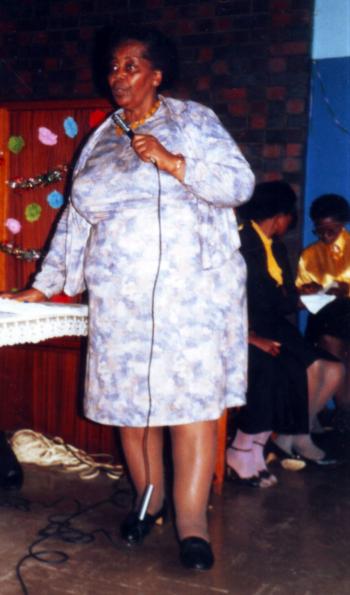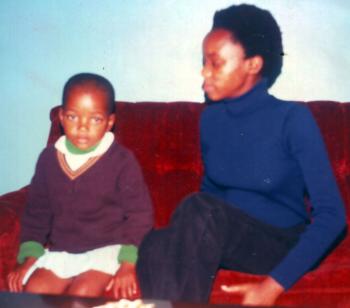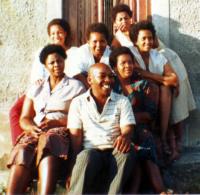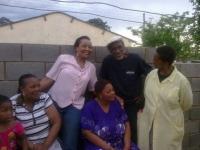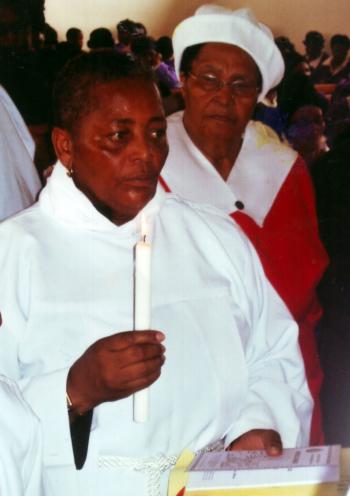Posted on August 10, 2010
The subject of family histories is one the Archival Platform's special interests. The Platform even has a special initiative on the subject and this encompasses the use of izithakazelo (clan praises) as an oral archive as well as an instrument for identity formation. I have found the subject fascinating as my own personal record does not follow the rules that usually inform personal praise in terms of ancestral lineage. Lineage is usually defined in terms of descendents of a common ancestor, along the male line, however, mine is defined along female lines. I have always known Mfene to be my clan name, Mfene can be defined as a totem that symbolises a baboon, and a direct translation of iMfene from isiXhosa is baboon. I inherited this clan name from my father, who in turn inherited it from his mother, my grandmother who was the daughter of the Katiya family of the Mfene clan. My grandmother Florence Wynona Nofumbalala Katiya was born to a very religious family in 1923. Her father, Chalmers Katiya was a priest who was one of the prominent members of the Presbyterian Church in rural Eastern Cape. Nofumbalala (the name used by all who knew my grandmother) was never married, however, she had three children, my father Dumile and two daughters, Nomonde and Nosisi. All her children used her surname, Katiya, and also performed all the Mfene rituals as it was their mother's tradition.
My father had a number of children but we all had different mothers and none of them were married to my father. My mother was very young when she had me so I was taken to live with my grandmother, Nofumbalala and grew up as a child of the Katiyas. I took part in all Mfene rituals even though according to traditional lineage, my father and I were not really Katiyas nor do we belong to the Mfene clan for that matter! We nonetheless all followed my grandmother's family ties as this was all that was available to us as a family and so a family identity was formed, one that was informed and shaped by the matriarch, Nofumbalala. Here none of the usual rules that inform belonging applied, all we had in common was that we were all children and grandchildren of Nofumbalala, the daughter of the amaMfene from Idutywa in the former Transkei.
My grandmother was also fond of helping others and as a result our household, a four- roomed house in the Mdantsane township in East London, became a refuge for the destitute and poor, whether they were relatives or distant family friends. Each time my grandmother attended a funeral or travelled to visit relatives, she would often return with an orphan or some other person that desperately needed a home, education and refuge at the time. These individuals also became part of the immediate family, often referring to themselves as being children of the Katiyas and so came to identify with the Mfene tradition. These are the people I came to regard as uncles, aunts, cousins, brothers and sisters. Our household was always a hub of activity with people from the community coming in and out to consult with my grandmother. She established a school, Phakamile Lower Primary School near our house and this then became an extension of our household. All the children that lived in my grandmother's house had to attend the school. Struggling parents from the community came to ask for their children to be admitted to the school even though there were no funds for fees or school uniform. Those that ended up living with us as a result of difficult circumstances often ended up taking up the Katiya name as it was just sometimes convenient to do so. Wives who had been beaten by their husbands often turned up on my grandmother's doorstep seeking refuge, she took them in and we all became one big happy family. Teachers at the school comprised of young women that were also 'rescued'Â by my grandmother from rural Eastern Cape, put through teacher training for a career in education. Some of the teachers regarded my grandmother as their mother, so they also became part of the extended family as some would even live in our household while they tried to establish themselves.
When my grandmother died in 1989, there was already an aunt who took on the role of a mother to me and ensured that I completed school and had a home. This was not new, this is how things were done in my family, all those that had been raised by my grandmother each took responsibility of continuing with raising others that were still young and had nowhere to go when my grandmother passed on. This tradition still continues in my family as I have uncles, aunts, cousins, brothers, sisters that otherwise would not be considered to be relatives, however, to me, they are family. We share the same surname, even clan name at times, but most of all we share the same memory of a matriarch who informs this different kind of family history. Like many black South Africans we also acknowledge our ancestors by performing certain rites and in doing so we draw on what is available to us and that is being Katiya of the amaMfene clan.
Although being Mfene or Katiya is a social construct for me, and not influenced by biology and blood lines, it forms part of my identity. I do not know what my 'true'Â or traditional lineage is, however, being referred to as MaMfene, Hlathi, Lisa, Jambase etc. is more meaningful for me. It gives me a sense of belonging and it keeps my grandmother's legacy alive as we are all connected by her. I almost lost Katiya as a surname when I had to apply for an identity document I found out that I had to use my legal surname, Kashe (my mother's surname that appeared my birth certificate). After making an appeal, I was allowed by Home Affairs to use my mother's surname as well as my father's surname which was an achievement for me as being Katiya was the embodiment of my acknowledgement of my grandmother. I have come to learn that this is not unique to my family, and that many in South Africa have been raised by people other than their parents as a result of migrant labour, apartheid laws and other social circumstances. This led to family units other than traditional ones being formed all the time.
This in turn distorted the notions of what we had come to understand as being representative of a family unit or clan. Many new identities were formed and these have also been incorporated into the traditional realm, meaning that acknowledgement of the ancestors and performance of certain traditional rites has also transformed.
Xolelwa Kashe-Katiya is the Deputy Director of the Archival Platform
